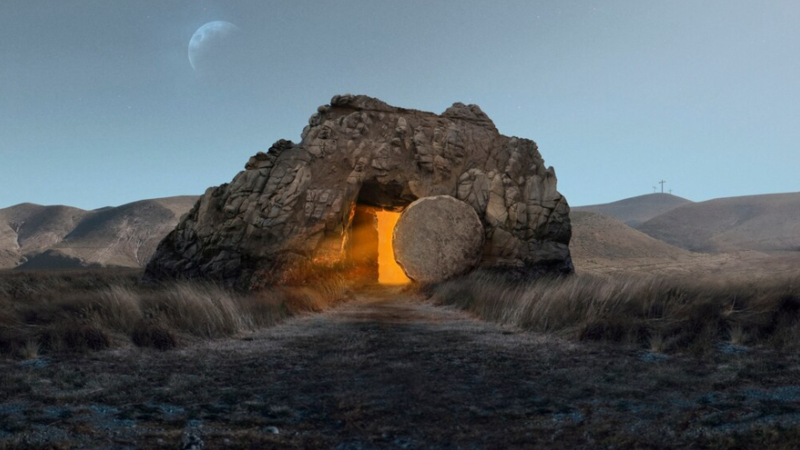Empty Tomb: Resurrection Sunday and Its Significance

The empty tomb on Resurrection Sunday holds profound meaning for Christians around the world. This pivotal event marks the triumph of Jesus Christ over death and is central to the Christian faith. In this article, we will explore the significance of the empty tomb and why Resurrection Sunday is celebrated with such fervor.
The Empty Tomb: A Symbol of Hope
The empty tomb is not just a historical artifact but a symbol of hope and renewal. On Resurrection Sunday, Christians commemorate the resurrection of Jesus Christ from the dead. This event, celebrated on the first Sunday after the first full moon following the vernal equinox, marks the end of Lent and the beginning of Easter.
The empty tomb signifies that death has been defeated. Jesus’ resurrection is a cornerstone of Christian belief, representing eternal life and the promise of salvation. For believers, it is a powerful reminder that even in the darkest times, there is always hope and renewal.
Historical Context of the Empty Tomb
The story of the empty tomb is rooted in the New Testament of the Bible. According to the Gospels, Jesus was crucified, died, and was buried in a tomb. On the third day after His crucifixion, the stone that sealed the tomb was found rolled away, and the tomb was empty.
The discovery of the empty tomb was first made by women who came to anoint Jesus’ body. They were greeted by an angel who announced that Jesus had risen. This event is recorded in all four Gospels: Matthew, Mark, Luke, and John. Each account provides details about the empty tomb and its significance.
Why Resurrection Sunday Matters
Resurrection Sunday, also known as Easter, is a celebration of Jesus’ victory over death. The empty tomb is the proof of this victory. This day is the culmination of the Christian liturgical calendar, bringing together themes of sacrifice, redemption, and joy.
For many Christians, Resurrection Sunday is a time to reflect on the meaning of Jesus’ sacrifice and to celebrate the new life He offers. Churches are often filled with joyful music, colorful decorations, and a sense of hope and renewal. The empty tomb serves as a reminder of the promise of eternal life and the forgiveness of sins.
Frequently Asked Questions
What is the significance of the empty tomb?
The empty tomb represents Jesus’ victory over death and His promise of eternal life. It is a central symbol of Christian faith, affirming that Jesus rose from the dead and offers salvation to believers.
How is Resurrection Sunday celebrated?
Resurrection Sunday is celebrated with special church services, festive meals, and various traditions such as Easter egg hunts. The celebration is marked by joy, gratitude, and reflection on the significance of Jesus’ resurrection.
Why is the empty tomb important in Christianity?
The empty tomb is important because it validates Jesus’ teachings and His divine nature. It confirms the belief that Jesus overcame death, fulfilling prophecies and providing a path to eternal life for believers.
How does the empty tomb relate to Easter traditions?
Easter traditions, such as decorating eggs and attending sunrise services, are rooted in the themes of resurrection and renewal. The empty tomb is the core of these traditions, symbolizing new life and hope.
Are there different ways to interpret the empty tomb?
Interpretations of the empty tomb can vary among Christian denominations and individual believers. However, the core message remains the same: Jesus’ resurrection signifies victory over death and the promise of eternal life.
Theological Implications of the Empty Tomb
The empty tomb has deep theological implications. It confirms Jesus’ divine nature and His role as the Savior. The resurrection is seen as the fulfillment of Old Testament prophecies and the establishment of a new covenant between God and humanity.
Christian theology holds that Jesus’ resurrection is a pivotal event in the plan of salvation. It demonstrates that through Jesus, humanity can achieve reconciliation with God. The empty tomb is a powerful testament to the reality of this promise.
Celebrating the Empty Tomb: Traditions and Customs
Various cultures have their own ways of celebrating the empty tomb. In many Western countries, Easter is associated with traditions such as egg painting and the Easter Bunny. These customs symbolize new life and rebirth, echoing the themes of Resurrection Sunday.
In some cultures, special church services and processions are held to honor the empty tomb and its significance. Traditional foods and festive gatherings bring families and communities together to celebrate the resurrection.
Conclusion
The empty tomb on Resurrection Sunday is a profound symbol of hope, renewal, and victory over death. It is the cornerstone of Christian faith, representing Jesus’ triumph and the promise of eternal life. The celebration of Resurrection Sunday brings together themes of sacrifice, redemption, and joy, offering a time for reflection and thanksgiving.
Understanding the significance of the empty tomb enriches our appreciation of this important event and its impact on Christian beliefs and traditions. As we celebrate Resurrection Sunday, we are reminded of the hope and renewal that the empty tomb represents.